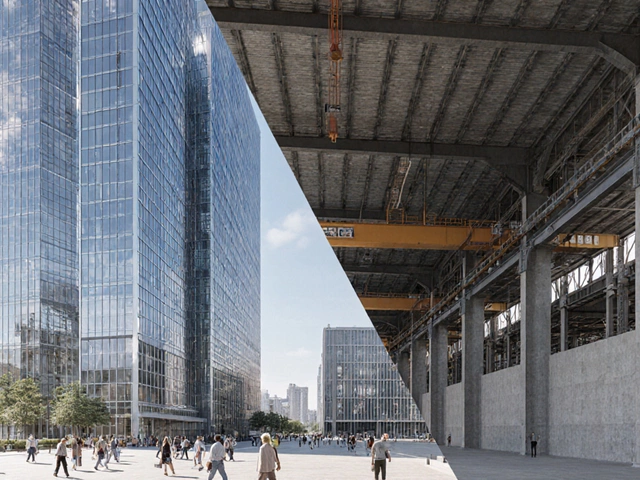People talk a lot about the money in construction, but few really explain how someone can go from swinging hammers to driving a new truck and filing seven-figure tax returns. Let's be real—most folks in construction make a living, but not wild fortunes. Still, you probably know a few construction bosses in your city who somehow pull it off. What's their secret?
If you’re hustling on a job site or thinking about launching your own crew, it’s fair to ask if there’s a path to millionaire status. This isn’t about get-rich-quick schemes. It’s about understanding the real opportunities and the dead-ends that stop people from cashing in big. Every decision—what markets to jump into, the clients you chase, even how you handle slow-pay contractors—shapes your odds of hitting that million-dollar goal.
So, how do people actually stack up big cash in construction? It starts with understanding where the real money is made, not just following the crowd. Get ready for some blunt, useful advice—because winning in construction isn’t about working harder, it’s about working smarter and playing the game right.
- How Money Flows in Construction
- Barriers to Building Wealth
- What Sets Millionaire Owners Apart
- Tips for Growing Your Construction Business
- Staying Rich: Pitfalls and Habits
How Money Flows in Construction
The construction industry isn’t just about tools and trucks—it’s about cash flow. Money moves fast, sometimes faster than you might expect. Here’s the deal: in any profitable construction company, cash usually starts at the top with client contracts. Companies get paid to build stuff: homes, offices, roads—you name it. The client signs a deal, often worth hundreds of thousands or even millions, and the payments usually roll out in chunks (called progress payments) as the work gets done.
The boss—the owner—gets the money first. But right away, a whole army needs to be paid: workers, suppliers, renters of heavy gear, maybe an architect or engineer. Then there’s insurance, taxes, gas, and whatever else pops up. If you don’t manage this flow right, you can land in debt before the job is even finished. Only what’s left after everybody gets paid (called net profit) can end up in your pocket. Want to see how it usually breaks down?
| Expense | Average % of Contract |
|---|---|
| Materials & Supplies | 25–40% |
| Labor | 20–35% |
| Equipment & Rentals | 10–15% |
| Overhead (permits, insurance, office) | 10–15% |
| Profit Before Tax | 5–10% |
Five to ten percent—yep, that’s the average take-home before taxes for most jobs. So out of a million-dollar job, your wealth might grow by $50K to $100K if things go well. That’s not bad, but it means you need to handle a lot of money and a lot of risk to see those big returns.
The people who really clean up are the ones who figure out how to run multiple jobs at once, cut down waste, and get paid on time. And if you’re smart, you make sure you’ve got cash reserves for slow weeks and surprise expenses. In construction, the difference between scraping by and getting rich usually comes down to how well you keep the money moving and under control. If you don’t watch every dollar, you’re just working for everyone else.
Barriers to Building Wealth
Want the honest truth? Most folks in construction never hit millionaire territory. There’s nothing magical holding them back—it’s a handful of tough roadblocks that crush most people’s dreams long before they crack six figures. If you want to be the exception, you’ve got to see these traps coming.
First up, cash flow is a constant battle. You’re fronting costs for labor and materials, but waiting forever for clients to pay. A 2024 survey found that 32% of construction companies say late payments are their top growth killer. It gets worse if your business is small or you’re just starting out—bankers don’t love lending to unpredictable markets.
Then there’s razor-thin profit margins. According to the Construction Financial Management Association, average net profits in commercial construction hover around 2%-5%. It doesn’t leave much room for mistakes, theft, or bad weather. Even one botched project can wipe out an entire year’s gains.
Here’s a quick look at some common barriers:
- Cash flow issues – Delayed payments, unreliable clients, and upfront costs drain your account fast.
- Low profit margins – Competition is fierce, and it’s tough to charge premium prices unless you’re a big name.
- Market swings – One year you’re swamped, the next you’re begging for jobs. Economic slowdowns hit construction hard.
- Insurance and liability – One lawsuit or major injury claim can bankrupt a small outfit overnight.
- Finding and keeping good workers – Skilled labor is rare, and training newbies slows things down and chews through cash.
Not convinced? Check out these 2024 numbers from a contractor trade group:
| Roadblock | % of Companies Affected |
|---|---|
| Late Payments | 32% |
| Labor Shortages | 45% |
| Tight Margins | 27% |
| Regulatory Burdens | 18% |
The truth? The construction grind is full of traps that keep most business owners hustling but never rich. If you want to make it big—really big—you have to know exactly what trips most people up, and tackle it differently. That’s what separates the bosses driving million-dollar trucks from the ones patching together paychecks.

What Sets Millionaire Owners Apart
So, what’s actually different about those construction company owners who make it to millionaire status while others scrape by? For starters, most don’t just know how to build stuff—they know how to build a business. They spend less time on the tools and more time planning, spotting risks, and negotiating deals.
Let’s break down what they do different:
- Systems Everywhere: They’ve got systems for everything—bidding, managing jobs, hiring, and chasing money. It means less chaos, fewer mistakes, and way more profit.
- They Don’t Compete on Price: Instead of fighting for scraps on the cheap jobs, they target better clients and higher-margin work. They go after commercial or specialty projects where the paychecks can double or triple what you’d get for basic home repairs.
- Network Strong: They know people. Good construction owners put in serious time building relationships with developers, big general contractors, property owners, and even city officials. These connections lead to bigger contracts and inside info on new projects.
- Smart with Money: They watch cash flow like a hawk. Millionaire owners rarely let one slow-paying client wreck their business. They use tools and tech—sometimes just good accounting software—to stay ahead of the money game.
- They Bet on Their Team: Hiring good people is a million-dollar move. Successful construction company bosses treat their best workers like gold, and invest in training crews instead of running a revolving door of new hires.
- Diversification: Many wealthy owners don’t stick to just one type of work. They branch out into other areas like property investment, equipment rental, or even side hustles in related trades.
A survey of over 500 American construction business owners by the National Association of Home Builders found that companies with systems for project management and regular financial reviews earned, on average, 45% higher profits compared to those just “winging it.”
| Habit/Strategy | Impact on Profitability |
|---|---|
| Standardized Operating Procedures | +28% |
| Targeted High-Margin Work | +35% |
| Strong Client Relationships | +22% |
| Regular Financial Tracking | +45% |
The folks making big money in construction didn’t just get lucky—they set themselves apart with smart moves and a totally different mindset. If you want to be one of them, start thinking like a business owner, not just a builder.
Tips for Growing Your Construction Business
If you want your construction company to actually hit millionaire status, you need more than just good tools and strong workers. Money follows great systems, smart decisions, and keeping clients happy. Here are some real ways to grow your business and boost your wealth:
- Know Your Numbers. Too many contractors skip this. Track every dollar spent and earned. Studies from the National Association of Home Builders show that over 65% of small construction businesses fail because they lose track of cash flow. Always know where you stand.
- Specialize, Don't Generalize. The millionaire winners often stick to a niche—commercial roofing, luxury remodels, or green builds—because specialties often pay better than general jobs. When you do unique jobs well, people pay premium rates.
- Upgrade Your Crew. Hire for attitude and reliability. Good workers save you headaches and money. Cutting corners by hiring cheap often backfires and leads to callbacks or repairs on your dime.
- Build Great Relationships. Contractors who grow fast keep strong ties with suppliers, subcontractors, and clients. Quick payments and good communication mean you get priority treatment—like first dibs on materials during shortages.
- Embrace Technology. Using project management software, bidding apps, or even simple online invoicing speeds things up and reduces mistakes. A 2023 survey by JBKnowledge found that companies using cloud-based tools handled 30% more jobs with less overhead.
- Market Like You Mean It. Your reputation matters more than any ad, but don’t ignore things like having a tidy website, local SEO, and active reviews on Google. Word-of-mouth is huge, but people still check your digital footprint before signing a contract.
| Growth Factor | Impact (%) |
|---|---|
| Cash Flow Management | 40 |
| Specialization | 20 |
| Quality Employees | 15 |
| Technology Adoption | 15 |
| Marketing & Reputation | 10 |
Bottom line: in the construction game, hard work matters, but building systems, focusing on profitable markets, and keeping your business lean are what get you over the finish line. The leap from earning good money to becoming a millionaire comes from discipline and smart strategy—most people miss that because they’re only thinking about the next job instead of the next five years.

Staying Rich: Pitfalls and Habits
Getting rich in construction is tough enough, but staying rich? That’s where things get really tricky. The truth is, lots of folks who hit that million-dollar mark don’t keep it for long. It’s easy to get comfortable, overspend, or let your guard down with the business finances—and then BAM, you’re back to square one.
One of the biggest pitfalls is letting your overhead balloon. Fancy offices, new trucks for every supervisor, and buying equipment you hardly use—it all eats into your margins. Pay attention to just how fast costs add up. A study in 2023 showed that around 45% of small construction company owners blamed cash flow management for their biggest money headaches.
Then there’s the temptation to slack on paperwork. Forgetting to bill a client, ignoring overdue invoices, or letting taxes slide can turn into a financial disaster real fast. Millionaire owners usually have systems—like solid accounting software or even just a tough-as-nails office manager—so nothing slips through the cracks.
The risk of bad projects is another money pit. Not every big job will make you rich; sometimes it’ll do the opposite. The sharpest owners are picky. They research clients, review contracts line by line, and price projects to protect their company’s bank account even if surprises hit.
There are clear habits that set the wealthiest construction bosses apart:
- Keep Living Below Your Means: It’s easy to look rich. The smart play is to act broke, even when you’re not. Save and invest, don’t just spend.
- Protect Your Profits: Stay on top of your numbers. Use reports and dashboards to catch problems before they spiral.
- Reinvest Wisely: Don’t dump money into every new gadget or truck on the market. Upgrade when it pays off, not just for show.
- Diversify Clients: Don’t rely too much on one source of income. If your biggest client bails, you don’t want to be left scrambling.
- Build a Back-Up Fund: The best owners sit on a fat reserve for when the economy tanks. Three to six months of fixed costs is smart.
Staying rich in this business means treating every dollar as if it could be your last. The ones who get sloppy or too comfortable usually end up watching that big bank account shrink. If you want your construction company to keep producing millions, remember: profits are what you keep, not what you make.






